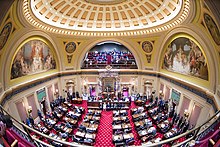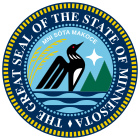Minnesota Senate
Minnesota Senate | |
|---|---|
| 93rd Minnesota Legislature | |
 | |
| Type | |
| Type | of the Minnesota Legislature |
Term limits | None |
| History | |
New session started | January 3, 2023 |
| Leadership | |
President pro tempore | |
| Structure | |
| Seats | 67 |
 | |
Political groups |
|
Length of term | 4 years when elected in years ending in 2 and 6. 2 years when elected in years ending in 0. |
| Authority | Article IV, Minnesota Constitution |
| Salary | $51,750/year + per diem [1] |
| Elections | |
| First-past-the-post | |
Last election | November 8, 2022 |
Next election | November 3, 2026 |
| Redistricting | Legislative control |
| Meeting place | |
 | |
| Senate chamber Minnesota State Capitol Saint Paul, Minnesota | |
| Website | |
| senate | |
| Rules | |
| Temporary Rules of the Senate | |
The Minnesota Senate is the upper house of the Legislature of the U.S. state of Minnesota. At 67 members, half as many as the Minnesota House of Representatives, it is the largest upper house of any U.S. state legislature.[2] Floor sessions are held in the west wing of the State Capitol in Saint Paul. Committee hearings, as well as offices for senators and staff, are located north of the State Capitol in the Minnesota Senate Building. Each member of the Minnesota Senate represents approximately 80,000 constituents.[3]
History
[edit]The Minnesota Senate held its first regular session on December 2, 1857.[4]
Powers
[edit]In addition to its legislative powers, certain appointments by the governor are subject to the Senate's advice and consent. As state law provides for hundreds of executive appointments, the vast majority of appointees serve without being confirmed by the Senate; only in rare instances does the Senate reject appointees.[5] It has rejected only nine executive appointments since 2000.[6]
Elections
[edit]Each Senate district is split between an A and B House district (e.g., Senate District 41 contains House districts 41A and 41B). The Minnesota Constitution forbids House districts that are within more than one Senate district.[7]
To account for decennial redistricting, members run for one two-year term and two four-year terms each decade. Senators are elected to four-year terms in years ending in 2 and 6, and to two-year terms in years ending in 0.[8] Districts are redrawn after the decennial United States Census in time for the primary and general elections in years ending in 2. The most recent election was held on November 8, 2022.
Leadership
[edit]From statehood through 1972, the lieutenant governor served as president of the Senate. In 1972, voters approved a constitutional amendment that provided for the Senate to elect its own president beginning January 1973.[9] The president, who presides over official Senate proceedings, also acts as the parliamentarian and oversees the secretary of the senate.[10] The majority leader is responsible for managing and scheduling the business of the Senate and oversees partisan and nonpartisan staff. The current majority leader is Erin Murphy, a Democrat from Saint Paul.[11] The current minority leader is Mark Johnson, a Republican from East Grand Forks.[12] Each caucus also selects its own leaders and deputy leaders.
Minnesota Senate Building
[edit]Committee hearings mostly take place in the Minnesota Senate Building, a 293,000-square-foot (27,200 m2) office building that opened in January 2016.[13] The $90 million office building, which is north of the State Capitol across University Avenue, includes three committee hearing rooms, offices for all senators and staff, a raised terrace overlooking the State Capitol, and a 264-space underground parking facility.[14]
The 2016 session was held in the newly constructed Minnesota Senate Building due to an extensive restoration at the State Capitol. It was the first time the Senate held a regular session outside the Capitol since it opened in 1905.[15]
Composition
[edit]Historical composition
[edit]| Years | Party[16] (Shading indicates majority caucus)
|
Total | |||
|---|---|---|---|---|---|
| Democratic– Farmer–Labor |
Republican | Independent | Vacant | ||
| 2001–2003 | 41 | 25 | 0 | 0 | 67 |
| 2003–2007 | 35 | 31 | 0 | 0 | 67 |
| 2007–2011 | 44 | 23 | 0 | 0 | 67 |
| 2011–2013 | 30 | 37 | 0 | 0 | 67 |
| 2013–2017 | 39 | 28 | 0 | 0 | 67 |
| 2017-2021 | 33 | 34 | 0 | 0 | 67 |
| 2021–2023 | 31 | 34 | 2 | 0 | 67 |
| 2023–2027 | 34 | 33 | 0 | 0 | 67 |
Current composition
[edit]- 93rd Minnesota Legislature (2023–2025)
| Party (Shading indicates majority caucus)
|
Total | Vacant | |||
|---|---|---|---|---|---|
| Republican | Independent | Democratic– Farmer–Labor | |||
| End of the previous Legislature | 34 | 1 | 31 | 66 | 1 |
| Begin 2023 | 33 | 0 | 34 | 67 | 0 |
| Latest voting share | 49% | 0% | 51% | ||
Members, 2023-2027
[edit]
 |
|---|
| Constitution |
See also
[edit]- Minnesota House of Representatives
- Minnesota Legislature
- Past composition of the Senate
- List of Minnesota state legislatures
Notes
[edit]References
[edit]- ^ "Frequently Asked Questions - Representatives and Senators - Minnesota Legislature".
- ^ Legislatures, National Conference of State. "Number of Legislators and Length of Terms in Years". www.ncsl.org. Retrieved January 8, 2025.
- ^ "Frequently Asked Questions - - Minnesota Legislature". www.leg.state.mn.us. Retrieved September 28, 2019.
- ^ "Sessions of the Minnesota State Legislature and the Minnesota Territorial Legislature, 1849-present". Minnesota Legislative Reference Library. Retrieved October 19, 2019.
- ^ "Creation and Organization of Executive Branch Agencies". Minnesota House of Representatives Research Department. Retrieved February 27, 2014.
- ^ "Senate Confirmations: Problematic Governor Appointments - Minnesota Legislative Reference Library". www.leg.state.mn.us. Retrieved October 19, 2019.
- ^ "Minn. Const. art. IV, § 3". Constitution of the State of Minnesota. Retrieved January 24, 2013.
- ^ "Minn. Const. art. IV, § 4". Constitution of the State of Minnesota. Retrieved January 24, 2013.
- ^ "President and President Pro Tempore of the Minnesota Senate, 1849-present". Minnesota Legislative Reference Library. Retrieved January 24, 2013.
- ^ "Minnesota Senate President and President Pro Tempore, 1849-present - Minnesota Legislative Reference Library". www.leg.state.mn.us. Retrieved October 19, 2019.
- ^ "Majority and Minority Leaders of the Minnesota Senate, 1933-present". Minnesota Legislative Reference Library. Retrieved September 10, 2021.
- ^ "Senate Member Information 2021 - 2022". Minnesota Legislature. Retrieved September 16, 2021.
- ^ Davis, Don (January 11, 2016). "Minnesota Senate Building quietly opens in spite of disagree..." Forum News Service. Retrieved November 21, 2017.
- ^ "After controversy, new Minnesota Senate Office Building finally opens". Twin Cities. January 11, 2016. Retrieved November 23, 2017.
- ^ Stassen-Berger, Rachel E. (August 6, 2017). "How the newly restored Minnesota Capitol came to be". St. Paul Pioneer Press. Retrieved October 19, 2019.
- ^ "Party Control of the Minnesota Senate". Minnesota Legislative Reference Library. Retrieved December 30, 2022.
